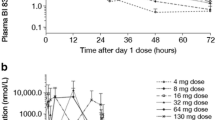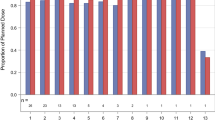Abstract
Purpose
Aurora kinases are overexpressed or amplified in numerous malignancies. This study was designed to determine the safety and tolerability of the Aurora A kinase inhibitor alisertib (MLN8237) when combined with weekly irinotecan.
Methods
In this single-center phase 1 study, adult patients with refractory advanced solid tumors received 100 mg/m2 irinotecan intravenously on day 1 and 8 of a 21-day cycle. Alisertib at planned escalating dose levels of 20–60 mg was administered orally twice per day on days 1–3 and 8–10. Patients homozygous for UGT1A1*28 were excluded. The primary objective was the safety of alisertib when combined with irinotecan to determine the maximum tolerated dose (MTD). Secondary objectives included overall response rate by RECIST and pharmacokinetics in a planned expansion cohort of patients with colorectal cancer treated at the MTD.
Results
A total of 17 patients enrolled at three dose levels. Dose-limiting toxicities included diarrhea, dehydration, and neutropenia. The MTD of alisertib combined with weekly irinotecan was 20 mg twice per day on days 1–3 and 8–10. One fatal cardiac arrest at the highest dose level tested was deemed possibly related to drug treatment. One partial response in 11 efficacy evaluable patients (9%) occurred in a patient with small cell lung cancer. The study was terminated prior to the planned expansion in patients with colorectal cancer.
Conclusion
In contrast to prior results in a pediatric population, adult patients did not tolerate alisertib combined with irinotecan at clinically meaningful doses due to hematologic and gastrointestinal toxicities. The study was registered with ClinicalTrials.gov under study number NCT01923337 on Aug 15, 2013.
Similar content being viewed by others
Data availability
Not applicable.
Code availability
Not applicable.
References
Katayama H, Brinkley WR, Sen S (2003) The Aurora kinases: role in cell transformation and tumorigenesis. Cancer Metastasis Rev 22:451–464
Camacho E, Bea S, Salaverria I et al (2006) Analysis of Aurora-A and hMPS1 mitotic kinases in mantle cell lymphoma. Int J Cancer 118:357–363
Sen S, Zhou H, Zhang RD et al (2002) Amplification/overexpression of a mitotic kinase gene in human bladder cancer. J Natl Cancer Inst 94:1320–1329
Chng WJ, Ahmann GJ, Henderson K et al (2006) Clinical implication of centrosome amplification in plasma cell neoplasm. Blood 107:3669–3675
Ikezoe T, Yang J, Nishioka C et al (2007) A novel treatment strategy targeting Aurora kinases in acute myelogenous leukemia. Mol Cancer Ther 6:1851–1857
Bischoff JR, Anderson L, Zhu Y et al (1998) A homologue of Drosophila aurora kinase is oncogenic and amplified in human colorectal cancers. EMBO J 17:3052–3065
Cervantes A, Elez E, Roda D et al (2012) Phase I pharmacokinetic/pharmacodynamic study of MLN8237, an investigational, oral, selective aurora a kinase inhibitor, in patients with advanced solid tumors. Clin Cancer Res 18:4764–4774. https://doi.org/10.1158/1078-0432.CCR-12-0571
Dees EC, Cohen RB, von Mehren M et al (2012) Phase I study of aurora A kinase inhibitor MLN8237 in advanced solid tumors: safety, pharmacokinetics, pharmacodynamics, and bioavailability of two oral formulations. Clin Cancer Res 18:4775–4784. https://doi.org/10.1158/1078-0432.CCR-12-0589
Le KN, Yu L, Manfredi M et al (2011) Evaluation of optimal dosing regimens for investigational drug Mln8237, an Aurora a Kinase inhibitor, in combination with Docetaxel through Pharmacokinetic-Pharmacodynamic (Pk-Pd) modeling of Hematological Toxicity. Clin Pharmacol Ther 89:S58–S59
Kondo R, Watanabe S, Shoji S et al (2018) A phase II study of Irinotecan for patients with previously treated small-cell lung cancer. Oncology 94:223–232. https://doi.org/10.1159/000486622
Courapied S, Cherier J, Vigneron A et al (2010) Regulation of the Aurora-A gene following topoisomerase I inhibition: implication of the Myc transcription factor. Mol Cancer 9:205. https://doi.org/10.1186/1476-4598-9-205 (1476-4598-9-205 [pii])
E. G. Lipsitz, V. Nguyen, H. Zhao, et al (2010) Modeling MLN8237, an aurora kinase a inhibitor, with irinotecan (IRN) and temozolomide (TMZ) in neuroblastoma (NB). J Clin Oncol 28:(suppl; abstr 10593)
Sak M, Zumbar CT, King PD et al (2019) Cytotoxic synergy between alisertib and carboplatin versus alisertib and irinotecan are inversely dependent on MGMT levels in glioblastoma cells. J Neurooncol 143:231–240. https://doi.org/10.1007/s11060-019-03164-5
Pitts TM, Bradshaw-Pierce EL, Bagby SM et al (2016) Antitumor activity of the aurora a selective kinase inhibitor, alisertib, against preclinical models of colorectal cancer. Oncotarget 7:50290–50301. https://doi.org/10.18632/oncotarget.10366
Venkatakrishnan K, Zhou X, Ecsedy J et al (2015) Dose selection for the investigational anticancer agent alisertib (MLN8237): Pharmacokinetics, pharmacodynamics, and exposure-safety relationships. J Clin Pharmacol 55:336–347. https://doi.org/10.1002/jcph.410
Shao Y, Lv H, Zhong D-S (2016) Different schedules of irinotecan administration: a meta-analysis. Mol Clin Oncol 5:361–366. https://doi.org/10.3892/mco.2016.920
Toffoli G, Cecchin E, Corona G et al (2006) The role of UGT1A1*28 polymorphism in the pharmacodynamics and pharmacokinetics of irinotecan in patients with metastatic colorectal cancer. J Clin Oncol 24:3061–3068. https://doi.org/10.1200/JCO.2005.05.5400
Iyer L, Das S, Janisch L et al (2002) UGT1A1*28 polymorphism as a determinant of irinotecan disposition and toxicity. Pharmacogenom J 2:43–47
Zhou X, Mould DR, Takubo T et al (2018) Global population pharmacokinetics of the investigational Aurora A kinase inhibitor alisertib in cancer patients: rationale for lower dosage in Asia. Br J Clin Pharmacol 84:35–51. https://doi.org/10.1111/bcp.13430
Zhou X, Pant S, Nemunaitis J et al (2018) Effects of rifampin, itraconazole and esomeprazole on the pharmacokinetics of alisertib, an investigational aurora a kinase inhibitor in patients with advanced malignancies. Invest New Drugs 36:248–258. https://doi.org/10.1007/s10637-017-0499-z
DuBois SG, Marachelian A, Fox E et al (2016) Phase I study of the Aurora A kinase inhibitor Alisertib in combination with Irinotecan and Temozolomide for patients with relapsed or refractory Neuroblastoma: a NANT (New Approaches to Neuroblastoma Therapy) trial. J Clin Oncol 34:1368–1375. https://doi.org/10.1200/JCO.2015.65.4889
Wagner LM, Crews KR, Stewart CF et al (2008) Reducing irinotecan-associated diarrhea in children. Pediatr Blood Cancer 50:201–207. https://doi.org/10.1002/pbc.21280
DuBois SG, Mosse YP, Fox E et al (2018) Phase II trial of Alisertib in combination with Irinotecan and Temozolomide for patients with relapsed or refractory Neuroblastoma. Clin Cancer Res 24:6142–6149. https://doi.org/10.1158/1078-0432.CCR-18-1381
Graff JN, Higano CS, Hahn NM et al (2016) Open-label, multicenter, phase 1 study of alisertib (MLN8237), an aurora A kinase inhibitor, with docetaxel in patients with solid tumors. Cancer 122:2524–2533. https://doi.org/10.1002/cncr.30073
Falchook G, Coleman RL, Roszak A et al (2019) Alisertib in combination with weekly Paclitaxel in patients with advanced breast cancer or recurrent Ovarian cancer: a randomized clinical trial. JAMA Oncol 5:e183773. https://doi.org/10.1001/jamaoncol.2018.3773
Owonikoko TK, Niu H, Nackaerts K et al (2020) Randomized phase II study of Paclitaxel plus Alisertib versus Paclitaxel plus Placebo as second-line therapy for SCLC: primary and correlative biomarker analyses. J Thorac Oncol 15:274–287. https://doi.org/10.1016/j.jtho.2019.10.013
Goff LW, Azad NS, Stein S et al (2019) Phase I study combining the aurora kinase a inhibitor alisertib with mFOLFOX in gastrointestinal cancer. Invest New Drugs 37:315–322. https://doi.org/10.1007/s10637-018-0663-0
Funding
This study was supported by Millennium Pharmaceuticals, Inc., a wholly owned subsidiary of Takeda Pharmaceutical Company Limited. The study was also supported by the National Cancer Institute under award P30CA093373. During the study, Dr. Semrad was also supported by the NCI under Award Number K12CA138464.
Author information
Authors and Affiliations
Corresponding author
Ethics declarations
Conflict of interest
Dr. Semrad reports grants (to the University of California, Davis for conduct of this study) from Millennium Pharmaceuticals, Inc.; Dr. Kim reports personal fees from Eisai, personal fees from Celgene, grants from BMS, grants from Astellas, grants from Samumed, grants from Boston Biomedical, grants from Halozyme, grants from EpicentRx, grants from Merck, grants from Oncomed, grants from Dynavax, personal fees from Lilly, grants from NGM Biopharmaceuticals, grants from Erytech, grants from Fibrogen, grants from Eureka Therapeutics, outside the submitted work; Dr. Gong has nothing to disclose; Dr. Li reports personal fees from Eisai, grants from Pfizer, grants from Merck, grants from Eureka, grants from OncoImmune (OncoC4), grants from Hengrui, grants from Tempus, outside the submitted work; Dr. Christensen has nothing to disclose; Dr. Arora has nothing to disclose; Dr. Riess reports personal fees from Blueprint, personal fees and non-financial support from Novartis, personal fees and non-financial support from Boehringer Ingelheim, personal fees from Celgene, non-financial support from AstraZeneca, personal fees and non-financial support from Spectrum, personal fees from Loxo Oncology, personal fees from Genentech, personal fees from Medtronic, non-financial support from Merck, non-financial support from Revolution Medicines, outside the submitted work; Dr. Gandara has nothing to disclose; Dr. Kelly reports grants and personal fees from Takeda.
Ethical approval
All procedures performed in studies involving human participants were in accordance with the ethical standards of the institutional and/or national research committee and with the 1964 Helsinki Declaration and its later amendments or comparable ethical standards. The study protocol was reviewed and approved by the institutional review board of the University of California, Davis.
Consent to participate
All patients provided written informed consent before treatment.
Consent for publication
All authors consent to publication.
Additional information
Publisher's Note
Springer Nature remains neutral with regard to jurisdictional claims in published maps and institutional affiliations.
Rights and permissions
About this article
Cite this article
Semrad, T.J., Kim, E.J., Gong, IY. et al. Phase 1 study of alisertib (MLN8237) and weekly irinotecan in adults with advanced solid tumors. Cancer Chemother Pharmacol 88, 335–341 (2021). https://doi.org/10.1007/s00280-021-04293-3
Received:
Accepted:
Published:
Issue Date:
DOI: https://doi.org/10.1007/s00280-021-04293-3




